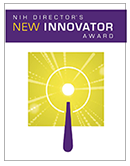2010 Awardees

Nathalie Y.R. Agar, Ph.D.
Brigham and Women’s Hospital / Harvard Medical School
Project Title: Real-Time Stereotactic Mass Spectrometry Tissue Analysis for Intraoperative Neurosurgical Guidance
Grant ID: DP2-OD007383

Ritesh Agarwal, Ph.D.
University of Pennsylvania
Project Title: Optoelectronic Nanowire Probes for Investigation of Intracellular Processes
Grant ID: DP2-OD007251
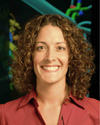
Rommie E. Amaro, Ph.D.
University of California, Irvine
Project Title: A Structural Systems Biology Approach to Drug Discovery
Grant ID: DP2-OD007237

Alexei Aravin, Ph.D.
California Institute of Technology
Project Title: Taming of Small RNA-Based Epigenetic Mechanisms
Grant ID: DP2-OD007371

Andrea M. Armani, Ph.D.
University of Southern California
Project Title: Ultrasensitive Nanolasers for Epigenetics Investigations
Grant ID: DP2-OD007391
Prof. Andrea Armani received her B.A. in physics from the University of Chicago (2001) and her Ph.D. in applied physics with a minor in biology from the California Institute of Technology (2007), where she continued as the Clare Boothe Luce post-doctoral Fellow in biology and chemical engineering. She is currently the Fluor Early Career Chair of Engineering and an Associate Professor of Chemical Engineering and Materials Science and Electrical Engineering-Electrophysics in the Viterbi School of Engineering at the University of Southern California. Prof. Armani’s research group focuses on the creation of polymeric and dielectric materials and the use of these materials to the fabrication of novel optical devices for understanding cancer progression.

Diana M. Bautista, Ph.D.
University of California, Berkeley
Project Title: New Approaches to Identify Molecular Mechanisms of Touch and Pain in Mammals
Grant ID: DP2-OD007123

Lynette S. Cegelski, Ph.D.
Stanford University
Project Title: Structure, Function, and Disruption of Microbial Amyloid Assembly and Biofilm Formation
Grant ID: DP2-OD007488

Jianjun Cheng, Ph.D.
University of Illinois at Urbana-Champaign
Project Title: Developing Clinically Applicable, Cancer-Targeting Polymeric Nanoconjugates
Grant ID: DP2-OD007246
Jianjun Cheng obtained a B.S. degree in Chemistry from Nankai University, China, in 1993, a M.S. degree in Chemistry from Southern Illinois University at Carbondale in 1996, and a Ph.D. degree in Materials Science from the University of California, Santa Barbara in 2001 with Professor Timothy Deming. He was a Senior Scientist at Insert Therapeutics, Inc. from 2001 to 2004, and a Postdoctoral Research Scientist at MIT with Professor Robert Langer from 2004 to 2005. He joined the Department of Materials Science and Engineering at the University of Illinois at Urbana-Champaign (UIUC) as a tenure-track Assistant Professor in 2005, and was promoted to Associate Professor in 2011 and to Full Professor in 2015. He is now developing new functional bionanomaterials for drug and gene delivery for cancer therapy and for cancer targeting.

Neil C. Chi, M.D., Ph.D.
University of California, San Diego, School of Medicine
Project Title: Directed Cardiac Cellular Programming: A New Paradigm for Cardiac Regeneration
Grant ID: DP2-OD007464

Adam Ezra Cohen, Ph.D.
Harvard University
Project Title: Optical Sensing of Voltage, pH, and Small Molecules Using Microbial Rhodopsins
Grant ID: DP2-OD007428
Adam Cohen is in the departments of Chemistry and Chemical Biology and Physics at Harvard and an investigator with the Howard Hughes Medical Institute. Current research in the Cohen Lab focuses on new approaches to imaging brain function. His work combines protein engineering, cell biology, advanced instrumentation, and development of computational methods.
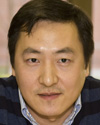
Chengkai Dai, Ph.D.
The Jackson Laboratory, Maine
Project Title: Role of a Novel Stress Response Mechanism-Genetic Buffering-in Tumor Evolution
Grant ID: DP2-OD007070
Chengkai Dai received his medical and M.S. degrees from Tianjin Medical University, China. As a graduate student, he used mouse models to study gliomagenesis with Dr. Eric Holland at MD Anderson Cancer Center in Houston and Memorial Sloan Kettering Caner Center in New York. After earning his Ph.D. degree from The University of Texas Health Science Center Houston in 2003, he worked with Dr. Susan Lindquist at Whitehead Institute for Biomedical Research in Boston to study the role of the proteotoxic stress response in tumorigenesis. At the beginning of 2009, he joined The Jackson Laboratory in Bar Harbor as an Assistant Professor and his laboratory focuses on understanding proteomic instability of cancer. He received a Children’s Tumor Foundation Young Investigator Award in 2006, an Ellison Medical Foundation New Scholar in Aging Award in 2009, and a NIH Director’s New Innovator Award in 2010.
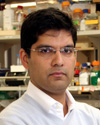
Sandeep Robert Datta, M.D., Ph.D.
Harvard Medical School
Project Title: Revealing Fear: New Methods to Study Neural Circuits, Behavior, and Disease
Grant ID: DP2-OD007109
Sandeep Robert Datta obtained a Bachelor of Science degree in Molecular Biochemistry and Biophysics from Yale University in 1993, and obtained an M.D./Ph.D degree from Harvard University in 2004. After working as a postdoctoral fellow at Columbia University with Richard Axel, he joined the Harvard Medical School Department of Neurobiology in 2009. His lab focuses on understanding how sensory cues — particularly odors — are detected by the nervous system, and how the brain transforms information about the presence of salient sensory cues into patterns of motivated action. This work involves studying genes involved in detecting odors, revealing the patterns of neural activity deep in the brain that encode sensory maps of the outside world, and probing the fundamental statistical structure of behavior itself. Dr. Datta has received the NIH New Innovator Award, the Burroughs Welcome Career Award in the Medical Sciences, the Alfred P. Sloan Research Fellowship, the Searle Scholars Award, the Vallee Young Investigator Award, the McKnight Endowment Fund Scholar Award and has been named a fellow of the National Academy of Science/Kavli Scholars program.

Dino Di Carlo, Ph.D.
University of California, Los Angeles
Project Title: Engineering the Intracellular Micro- and Nanoenvironment
Grant ID: DP2-OD007113
Dino Di Carlo is Professor in the department of Bioengineering at the University of California, Los Angeles. He received his B.S. in Bioengineering from the University of California, Berkeley in 2002, and received a Ph.D. in Bioengineering from the University of California, Berkeley and San Francisco in 2006. He then conducted postdoctoral studies from 2006-2008, at the Center for Engineering in Medicine at Harvard Medical School and Massachusetts General Hospital. He has made unique contributions across fields, uncovering fundamental microscale fluid physics, developing next-generation single-cell analysis tools, engineering microscale multifunctional materials and connecting cell physical properties to underlying disease. Among other honors he was awarded the National Science Foundation (NSF) Faculty Early Career Development award and the U.S. Office of Naval Research (ONR) Young Investigator Award in 2012, the Packard Fellowship for Science and Engineering and Defense Advanced Research Projects Agency (DARPA) Young Faculty Award in 2011, and received the Coulter Translational Research Award in 2010.

Alexander R. Dunn, Ph.D.
Stanford University
Project Title: Uncovering New Roles for Mechanical Force in Tissue Development and Extracellular Matrix Remodeling
Grant ID: DP2-OD007078

Conor L. Evans, Ph.D.
Massachusetts General Hospital / Harvard Medical School
Project Title: Imaging and Overcoming Hypoxia-Induced Resistance in Metastatic Ovarian Cancer
Grant ID: DP2-OD007096

Brian J. Feldman, M.D., Ph.D.
Stanford University
Project Title: Using Components of the Circadian Clock to Regulate Stem Cell Fate Decisions
Grant ID: DP2-OD006740
Dr. Feldman earned his M.D. and Ph.D. at Stanford Medical School. He then went on to complete his residency in Pediatrics at Children’s Hospital Boston, and served as a Pediatric Endocrinology postdoctoral fellow at the University of California, San Francisco. He returned to Stanford to open his independent laboratory as a faculty member in the Department of Pediatrics and Program in Regenerative Medicine. Dr. Feldman's research is investigating a number of aspects of hormone action that impact stem cell biology and stem cell fate decisions. In particular, he is developing tools based on hormonal signaling pathways that regulate circadian clock components in stem cells to modulate cell fate decisions in vivo in an attempt to generate novel therapeutics for a variety of diseases. In recognition of his innovative research, Dr. Feldman has been given numerous prestigious awards including the Lawson Wilkin’s Scholar Award from the Pediatric Endocrine Society, the Young Investigator Award from the Society of Pediatric Research, the Early Investigator Award from the Endocrine Society and the Bechtel Endowed Faculty Scholar Award.

M. Julia B. Felippe, D.V.M., Ph.D.
Cornelll University College of Veterinary Medicine
Project Title: Epigenetics: A Novel Approach in Primary Immunodeficiencies
Grant ID: DP2-OD007216
Julia Felippe is an associate professor at Cornell University College of Veterinary Medicine. Julia received her veterinary degree at Faculdade de Medicina Veterinaria e Zootecnia, University of Sao Paulo – UNESP, Botucatu, a Master of Science at Kansas State University, and a Ph.D. in immunology at Cornell University. Julia is board-certified by the American College of Veterinary Internal Medicine. She assists large animal patients at the veterinary hospital, and runs a clinical immunology laboratory that provides immunologic testing for horses. Her research program studies developmental immunology and immunodeficiencies, particularly common variable immunodeficiency (CVID) in horses. Current questions focus on epigenetic mechanisms of disease that can be applied to regenerative clinical intervention; for instance, reversing aberrant epigenetics in hematopoietic stem cells for the development and transplantation of autologous B cells in patients with humoral immunodeficiencies.

Michael A. Fischbach, Ph.D.
University of California, San Francisco
Project Title: Identifying and Characterizing Small Molecules from the Human Microbiome
Grant ID: DP2-OD007290
Michael Fischbach is an Associate Professor in the Department of Bioengineering and Therapeutic Sciences at UCSF and a member of the California Institute for Quantitative Biosciences (QB3). Fischbach is a recipient of the NIH Director's New Innovator Award, a Fellowship for Science and Engineering from the David and Lucille Packard Foundation, a Medical Research Award from the W.M. Keck Foundation, a Burroughs Wellcome Fund Investigators in the Pathogenesis of Infectious Disease award, a Glenn Award for Research in Biological Mechanisms of Aging, and the Young Investigator Grant for Probiotics Research from the Global Probiotics Council. His laboratory uses a combination of genomics and chemistry to identify and characterize small molecules from microbes, with an emphasis on the human microbiome. Fischbach received his Ph.D. as a John and Fannie Hertz Foundation Fellow in chemistry from Harvard in 2007, where he studied the role of iron acquisition in bacterial pathogenesis and the biosynthesis of antibiotics; before coming to UCSF, he spent two years as an independent fellow at Massachusetts General Hospital coordinating a collaborative effort based at the Broad Institute to develop genomics-based approaches to the discovery of small molecules from microbes. Fischbach is a member of the scientific advisory boards of NGM Biopharmaceuticals, Reckitt Benckiser, Symbiota, and Warp Drive Bio, and a member of Genentech's Scientific Resource Board.

Benjamin A. Garcia, Ph.D.
Princeton University
Project Title: Novel Methodology for Quantitative High-Throughput Cancer Epigenetics
Grant ID: DP2-OD007447
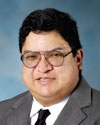
Thomas M. Guerrero, M.D., Ph.D.
The University of Texas M.D. Anderson Cancer Center
Project Title: Spatially Accurate Deformable Image Registration for Thoracic CT Application
Grant ID: DP2-OD007044
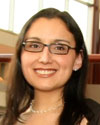
Monica L. Guzman, Ph.D.
Cornell University Weill Medical College
Project Title: Selection of Novel Therapies to Ablate Chemoresistant Myeloid Leukemia Stem Cell
Grant ID: DP2-OD007399

Amy Elizabeth Herr, Ph.D.
University of California, Berkeley
Project Title: Towards High Throughput Proteomics: A Micro/Nanofluidic Framework for Blotless Western Technology
Grant ID: DP2-OD007294
Amy E. Herr received her B.S. in Engineering & Applied Sciences from the California Institute of Technology (Caltech). As a Ph.D. student at Stanford University, she studied electrokinetic transport in and design of multi-dimensional separations, with Profs. Thomas Kenny and Juan Santiago. She then held a staff scientist position at Sandia National Laboratories, where she turned her focus to design of microfluidic immunoassays for clinical disease diagnostics and for life sciences tools with single cell resolution. Amy joined the Bioengineering Department at the University of California, Berkeley as an Assistant Professor (2007), where she now holds the Lester John & Lynne Dewar Lloyd Distinguished Professorship. Her laboratory employs approaches drawn from chemical, mechanical, and electrical engineering with strong foundations in materials science and analytical chemistry to advance measure tools for the "mathematization" of biology & medicine.

Julie C. Dunning Hotopp, Ph.D.
University of Maryland School of Medicine
Project Title: Impact of Bacterial-Animal Lateral Gene Transfer on Human Health
Grant ID: DP2-OD007372

Tony Jun Huang, Ph.D.
Pennsylvania State University
Project Title: On-Chip Optofluidic Laser Scanning Confocal Microscope for Early Cancer Detection
Grant ID: DP2-OD007209
Tony Jun Huang is a professor in the Department of Engineering Science and Mechanics at The Pennsylvania State University. He received his Ph.D. degree in Mechanical and Aerospace Engineering from the University of California, Los Angeles (UCLA) in 2005, and his B.S. and M.S. degrees in Energy and Power Engineering from Xi’an Jiaotong University, Xi’an, China, in 1996 and 1999, respectively. His research interests are in the fields of acoustofluidics, optofluidics, and micro/nano systems for biomedical diagnostics and therapeutics. He has authored/co-authored over 150 peer-reviewed journal publications in these fields. His journal articles has been cited more than 4400 times at Web of Science (h-index: 37). He also has 15 patents and invention disclosures. He is a fellow of American Institute for Medical and Biological Engineering (AIMBE), Institute of Physics (IoP), and Royal Society of Chemistry (RSC). His work have been recognized with awards and honors such as a 2010 National Institutes of Health (NIH) Director’s New Innovator Award, a 2011 Penn State Engineering Alumni Society Outstanding Research Award, a 2011 JALA Top Ten Breakthroughs of the Year Award, a 2012 Outstanding Young Manufacturing Engineer Award from Society for Manufacturing Engineering, a 2013 Faculty Scholar Medal from The Pennsylvania State University, a 2013 American Asthma Foundation (AAF) Scholar Award, and the 2014 IEEE Sensors Council Technical Achievement Award from The Institute of Electrical and Electronics Engineers (IEEE).

Yu Huang, Ph.D.
University of California, Los Angeles
Project Title: Graphene Nanostructures as a New Platform for Ultrasensitive Multiplexed Biological Sensors
Grant ID: DP2-OD007279
Professor Yu Huang receives her Ph.D. in physical chemistry from Harvard University and her B.S. in chemistry from University of Science and Technology of China. At UCLA she explores the unique technological opportunities that result from the structure and assembly of nanoscale building blocks. Focusing on the molecular level, she conducts research to unravel the fundamental principles governing nanoscale material synthesis and assembly; and utilizes such principles to design nanostructures and nanodevices with unique functions and properties to address critical challenges in electronics, energy science and biomedicine. Recognitions she received include the World’s Top 100 Young Innovators, Nano 50 Awards, the Sloan Fellowship, the PECASE, DARPA Young Faculty Award and the NIH New Innovator Award.

Michelle Khine, Ph.D.
University of California, Irvine
Project Title: Shrink Induced Manufacturing Platform for Low-Cost Diagnostics
Grant ID: DP2-OD007283
Michelle Khine is currently an Associate Professor of Biomedical Engineering, Chemical Engineering and Materials Science at UC Irvine. Michelle was recently appointed Director of Faculty Innovation at the Henry Samueli School of Engineering and as Director of BioENGINE (BioEngineering Innovation and Entrepreneurship) at the Institute for Innovation, at UC Irvine. Michelle received her B.S. and M.S. from UC Berkeley in Mechanical Engineering and her Ph.D. in Bioengineering from UC Berkeley and UCSF. She was the Scientific Founder of Fluxion Biosciences, Shrink Nanotechnologies, Novoheart, TinyKicks, and her STEM-outreach initiative, 100 Tiny Hands. Michelle was the recipient of the TR35 Award, named Forbes ’10 Revolutionaries’, by Fast Company Magazine as one of the '100 Most Creative People in Business' and by Marie-Claire magazine as 'Women on Top: Top Scientist' and was recently inducted as a Fellow of AIMBE (American Institute of Medical and Biological Engineering).

Ophir D. Klein, M.D., Ph.D.
University of California, San Francisco
Project Title: An Evolutionary-Developmental Approach to Stem Cells Using Teeth as a Model
Grant ID: DP2-OD007191
Ophir Klein is the Larry L. Hillblom Distinguished Professor in Craniofacial Anomalies, Professor of Orofacial Sciences and Pediatrics, and Chair of the Divisions of Craniofacial Anomalies and Orthodontics at the University of California, San Francisco (UCSF). He is also the Medical Director of the UCSF Craniofacial Center and Director of the UCSF Program in Craniofacial Biology. Dr. Klein was educated at the University of California, Berkeley, where he earned a B.A. degree in Spanish Literature. He subsequently attended Yale University School of Medicine, where he received a Ph.D. in Genetics and an M.D. degree. He then completed residencies at Yale-New Haven Hospital in Pediatrics and at UCSF in Clinical Genetics. Work in Dr. Klein’s research group centers on organ development and regeneration, with a major focus on understanding the processes underlying craniofacial development and integrating evolutionary and developmental approaches.
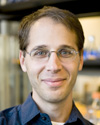
Joshua A. Kritzer, Ph.D.
Tufts University
Project Title: Drugging the Undruggable: Targeting Transcription Factors with Small Cyclic Peptides
Grant ID: DP2-OD007303
Joshua Kritzer is an Associate Professor at Tufts University’s Department of Chemistry and a member of the Sackler School for Graduate Biomedical Studies. He received a Ph.D. in Biophysical Chemistry at Yale University and did postdoctoral research in genetics with Dr. Susan Lindquist at the Whitehead Institute. The Kritzer Lab targets disease-associated proteins that are “undruggable” via traditional means, using new strategies that cut across synthetic chemistry, biochemistry, biophysics, genetics and cell biology.

Diana J. Laird, Ph.D.
University of California, San Francisco
Project Title: Cell Competition in the Developing Mouse Germline
Grant ID: DP2-OD007420
Dr. Laird is an Associate Professor in the UCSF Department of Obstetrics, Gynecology and Reproductive Sciences and the Eli and Edythe Broad Center for Regeneration Medicine and Stem Cell Research. She received her Ph.D. in stem cell biology from Stanford with Irving Weissman and completed postdoctoral training in developmental genetics at Sloan Kettering Institute with Kathryn Anderson. She holds an A.B. in Physics from Harvard. Her research centers on the development of the gametes, with a focus on the genetic and epigenetic mechanisms in the embryo that determine the quantity of and quality of eggs or sperm in the adult. These endeavors are aimed toward understanding infertility, chromosomal abnormalities, and impact of environmental exposures on reproductive health.

Erin Lavik, Sc.D.
Case Western Reserve University
Project Title: Clinically Translatable Nanotechnology: Hemostasis and Neuroprotection
Grant ID: DP2-OD007338

Jin Hyung Lee, Ph.D.
University of California, Los Angeles
Project Title: In Vivo Control and Functional Visualization of Stem Cell-Driven CNS Regeneration
Grant ID: DP2-OD007265
Jin Hyung Lee is an Assistant Professor of Neurology and Neurological Sciences, Bioengineering, Neurosurgery, and Electrical Engineering (Courtesy) at Stanford University. Dr. Lee received her Bachelor’s degree from Seoul National University and Masters and Doctoral degree from Stanford University, all in Electrical Engineering. As an Electrical Engineer by training with Neuroscience research interest, her goal is to analyze, debug, and engineer the brain circuit through innovative technology.
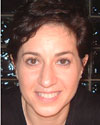
Hara Levy, M.D.
Northwestern University Feinberg School of Medicine and Ann and Robert H. Lurie Children’s Hospital
Project Title: Integration of Genomics with Genetics - Molecular Phenotypes for CF Lung Disease
Grant ID: DP2-OD007031
The Levy lab focuses on integrating genetic and genomic analyses to advance our understanding of how environmental, genetic, and epigenetic factors influence the progression of CF. Although CF is a monogenic autosomal recessive disorder caused by mutations in the gene encoding cystic fibrosis transmembrane regulator (CFTR), clinical heterogeneity causes diagnostic uncertainty, especially in infants without symptoms and in older patients with milder phenotypes. A variety of genetic, epigenetic, and environmental factors further complicate the evolution of CF in each patient. For example, infection with the Gram-negative pathogen Pseudomonas aeruginosa accounts for most of the morbidity and mortality associated with lung disease in CF; we suspect that a set of immune proteins contributes to the severity of CF lung disease by mediating innate immunity to P. aeruginosa infection. Other changes in gene expression occur in CF, affecting fluid and electrolyte transport, intracellular trafficking, and inflammation. Thus, CF arises from the activities of genes and proteins within a complex transcriptional and functional framework. Global analyses are therefore critical to monitoring gene and protein expression and to understanding the mechanisms underlying the extensive phenotypic heterogeneity of CF. In the Levy lab, we use a novel approach to generate genome-wide expression profiles of CF patients over time. Molecular and cellular assays allow us to refine the mechanisms that underpin these changes in expression, and we are in the process of developing strategies to examine the expression of miRNAs and genes associated with single-nucleotide polymorphisms and/or copy-number variants. We anticipate that these investigations will highlight genes/proteins that define a patient’s clinical course and treatment response. Our clinical interests include establishing molecular definitions of disorders of the CF spectrum, such as CFTR-related diseases and CFTR-related metabolic syndrome, as well as exploring the impact of CFTR mutations on gene expression, predictors of lung-disease severity, newborn screening, and therapeutic responsiveness.

Ruth E. Ley, Ph.D.
Cornell University
Project Title: Development of Immunization Strategies to Reshape Pathogenic Microbiomes
Grant ID: DP2-OD007444

Minkui Luo, Ph.D.
Memorial Sloan-Kettering Cancer Center
Project Title: Enzyme-Engineering Approaches to Dissect Protein Methylation Profiles
Grant ID: DP2-OD007335
Minkui Luo obtained his B.S. degree in organic chemistry at Fudan University in 1999. He then traveled to the U.S. to pursue his Ph.D. in the field of bioorganic and bioinorganic chemistry under the guidance of Dr. John T. Groves, at Princeton. Then, in 2005, I joined the laboratory of Dr. Vern Schramm as a postdoctoral fellow at the Albert Einstein College of Medicine. In 2008, he started his independent career at the Memorial Sloan-Kettering Cancer Center and Weill Cornell Medical College (joint appointment). The current research in the Luo laboratory focuses on developing and implementing chemical tools to define, perturb and manipulate epigenetic functions of protein methyltransferases for disease diagnosis and therapy. Besides NIH New Innovator Award, Dr. Luo is also the recipient of ACS Eli Lilly Award of Biological Chemistry (2015), CTSC Novel Award (2014), Basil O'Connor Starter Scholar Award (2011), Alfred W. Bressler Scholar Award (2010), and the V Scholar Award for Cancer Research (2009).

Michael B. Major, Ph.D.
University of North Carolina at Chapel Hill
Project Title: Exploitation of Near-Haploid Human Cells for Functional Gene Discovery
Grant ID: DP2-OD007149
Ben Major is an assistant professor of Cell Biology and Physiology within the Lineberger Comprehensive Cancer Center at UNC-CH. He received his B.S. in microbiology from the Lyman Briggs College at Michigan State University where he worked on polyoma viruses in Michele Fluck’s laboratory. Ben received his Ph.D. in Oncological Sciences from the Huntsman Cancer Institute at the University of Utah. His graduate work in David Jones’ laboratory focused on the mechanics of TGF-b signaling in cancer models and in zebrafish. From there, Ben moved to Seattle for a post-doctoral position in Randall T. Moon’s laboratory where he helped develop proteomic and functional screening strategies to interrogate the WNT signaling pathway. Ben’s laboratory at UNC uses an integrative platform of mass spectrometry-based proteomics, functional genomics and computation to study how alterations in WNT and KEAP1/NRF2 signal transduction contribute to human disease.

John C. March, Ph.D.
Cornell University
Project Title: Engineering Commensal Bacteria as Therapeutic Signal Mediators
Grant ID: DP2-OD007155

Timothy J. Nelson, M.D., Ph.D.
Mayo Clinic College of Medicine
Project Title: Dysfunctional Regeneration in Cardiomyopathy: iPS-Based Diagnosis and Therapy
Grant ID: DP2-OD007015
Dr. Nelson earned his Ph.D. and M.D. from the Medical College of Wisconsin in Milwaukee, Wisconsin. His residency and fellowship work was done at Mayo Clinic in Rochester. He is currently an Associate Professor of Medicine and Director of the Todd and Karen Wanek Family Program for Hypoplastic Left Heart Syndrome at Mayo Clinic in Rochester. Dr. Nelson’s research work is focused on cardiovascular regeneration using bioengineered stem cells to improve the ability to discover, diagnose, and ultimately treat mechanisms of degenerative diseases such as cardiomyopathy. Building on expertise of embryology and cardiac developmental biology to study lineage specific defects in pluripotent stem cells, his research program is striving to translate innovative applications based on iPS technology into clinical applications in human diseases involving mitochondrial defects. This individualized platform allows for pharmacological-based screening efforts to identify novel therapeutic targets using patient-specific stem cell and differentiated derivatives.

Alexander B. Niculescu, M.D., Ph.D.
Indiana University School of Medicine
Project Title: Developing Blood Tests for Mood Disorders
Grant ID: DP2-OD007363

Jacquin C. Niles, M.D., Ph.D.
Massachusetts Institute of Technology
Project Title: Engineered Regulated RNA Localization and Transport in Biological Systems
Grant ID: DP2-OD007124
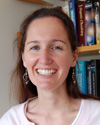
Elizabeth M. Nolan, Ph.D.
Massachusetts Institute of Technology
Project Title: Antibacterial Peptides and Zinc in Innate Immunity and Mammalian Physiology
Grant ID: DP2-OD007045
Elizabeth Nolan received her B.A. in Chemistry from Smith College, and she pursued her Ph.D. research under the guidance of Professor Stephen J. Lippard at the Massachusetts Institute of Technology. She was a NIH post-doctoral fellow with Professor Christopher T. Walsh at Harvard Medical School. She is currently an Associate Professor of Chemistry at the Massachusetts Institute of Technology. Her independent research focuses on the roles of transition metal ions in the host/microbe interaction with particular emphasis on metal-chelating human host-defense proteins as well as bacterial siderophores.

Manu O. Platt, Ph.D.
Georgia Institute of Technology
Project Title: Multiscale, Mechanistic, and Predictive Models of Stroke in Sickle Cell Disease
Grant ID: DP2-OD007433
Manu O. Platt received his B.S. in Biology from Morehouse College and his Ph.D. in Biomedical Engineering from the Georgia Institute of Technology and Emory University School of Medicine joint program studying endothelial cell biology and flow-mediated proteolytic remodeling during atherosclerosis progression under the mentorship of Dr. Hanjoong Jo. He then went onto postdoctoral training at MIT in orthopedic tissue engineering and systems biology with co-advisement by Dr. Douglas Lauffenburger and Dr. Linda Griffith. He began his independent career in January 2009, at the Coulter Dept of Biomedical Engineering at Georgia Tech/Emory, and is currently an associate professor. The Platt Lab studies proteolytic mechanisms in a number of diseases: pediatric strokes in children with sickle cell disease (for which his New Innovator was funded), HIV-mediated cardiovascular disease, and personalized medicine applications to predict individual patient-specific cancer metastasis potential.

Patrick Seale, Ph.D.
University of Pennsylvania
Project Title: Molecular Regulation of Brown Adipose Cell Fate in Somitic Stem Cells
Grant ID: DP2-OD007288

Balaji Sitharaman, Ph.D.
State University of New York at Stony Brook
Project Title: Nanotechnology-Based Theranostic Technology for Bone Tissue Engineering
Grant ID: DP2-OD007394

Luke S. Theogarajan, Ph.D.
University of California, Santa Barbara
Project Title: Bio-Ionic Neural Interfaces
Grant ID: DP2-OD007472
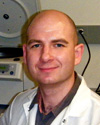
Budd A. Tucker, Ph.D.
The University of Iowa Carver College of Medicine
Project Title: Development of a Cell Replacement Therapy to Treat Retinal Degenerative Blindness
Grant ID: DP2-OD007483

Joseph Wade, Ph.D.
Wadsworth Center, New York State Department of Health / University at Albany, State University of New York
Project Title: Pervasive Transcription in Bacterial Genomes
Grant ID: DP2-OD007188
Joseph Wade is a Research Scientist at the Wadsworth Center, New York State Department of Health, and an Assistant Professor at the University at Albany, SUNY. Joe received his Ph.D. in Steve Busby’s group at the University of Birmingham, U.K. He then worked as a postdoctoral fellow in Kevin Struhl’s lab at Harvard Medical School. Joe’s group studies gene regulation in bacteria, with an emphasis on genome-scale approaches. Specific areas of interest include the impact of pervasive transcription in bacterial genomes, genomic analysis of transcription factor function, and regulatory networks associated with virulence in bacterial pathogens.

Lauren A. Weiss, Ph.D.
University of California, San Francisco
Project Title: Dissecting Epistasis and Pleiotropy in Autism Towards Personalized Medicine
Grant ID: DP2-OD007449

Pak Kin Wong, Ph.D.
The University of Arizona
Project Title: Mechanoregulation of Tissue Morphogenesis
Grant ID: DP2-OD007161
Pak Kin Wong is a Professor of Biomedical Engineering, Mechanical Engineering and Surgery at Pennsylvania State University. He was a faculty at the University of Arizona from 2006 to 2015. His laboratory develops advanced manufacturing strategies for elucidating mechanoregulation of collective cell migration in tissue regeneration and cancer metastasis and developing microfluidic systems for medical diagnostics. His group has established a nanoengineered systems framework, which combines bio fabrication of organotypic and 3D tissue models, nanoengineered probes for single cell gene expression analysis and ablation, biomechanical analysis of cell-cell and cell-matrix interaction, and agent-based computational modeling, for elucidating collective migration in tissue development and cancer metastasis. Among other honors, Dr. Wong was awarded the NIH Director's New Innovator Award in 2010, Arizona Engineering Faculty Fellow in 2011, AAFSAA outstanding Faculty Award in 2013, and JALA 10 – A Top 10 Breakthrough in Innovation in 2015.

Changhuei Yang, Ph.D.
California Institute of Technology
Project Title: Applications of Time-Reverse Tissue Turbidity Suppression to Improve Biophotonics
Grant ID: DP2-OD007307
Professor Yang's research efforts are in the areas of novel microscopy development and time-reversal based optical focusing. His group pioneered the Fourier Ptychographic imaging method that allows rendering of very high pixel count and large field of view microscopy images. His group also pioneered the use of wavefront engineering and phase conjugation methods to focus light deep within highly turbid biological tissues.
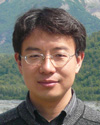
Peng Yin, Ph.D.
Harvard University
Project Title: Engineering Bioimaging Probes Based on Triggered Molecular Geometry
Grant ID: DP2-OD007292
Peng Yin is an Associate Professor of Systems Biology at Harvard Medical School and a Core Faculty Member at Wyss Institute for Biologically Inspired Engineering at Harvard University. He directs the Molecular Systems Lab at Harvard. His research interests lie at the interface of information science, molecular engineering, and biology. The current focus is to engineer information directed self-assembly of nucleic acid (DNA/RNA) structures and devices, and to exploit such systems to do useful molecular work. Such de novo designed systems are composed of small synthetic DNA/RNA monomers capable of conditional configuration change and can be programmed to self-assemble, move, and compute. They can serve as programmable controllers for the spatial and temporal arrangements of diverse functional molecules (e.g. fluorophores, proteins), with a wide range of applications in nano-fabrication, imaging, sensing, diagnostics, and therapeutics. See his work at http://molecular-systems.net.

Xilin Zhao, Ph.D.
New Jersey Medical School-University of Medicine and Dentistry of New Jersey
Project Title: Anaerobic Shock as a Novel Treatment for Tuberculosis
Grant ID: DP2-OD007423
Xilin Zhao is a principal investigator at the Public Health Research Institute (PHRI) and an Associate Professor in the Department of Microbiology, Biochemistry & Molecular Genetics at the New Jersey Medical School, Rutgers University. He obtained B.S. and M.S. training at Nankai University, China, and a Ph.D. from the John Innes Centre/University of East Anglia, UK. He worked with Karl Drlica at PHRI for more than a decade to develop the mutant selection window hypothesis, a framework for suppressing the emergence of antimicrobial resistance by adjusting dosing. He then opened his own lab at PHRI, which now addresses two new directions to better control bacterial infections. One program focuses on the live-or-die bacterial stress response to find new targets for small-molecule antimicrobial enhancers. The other program involves development of a novel, gas-based therapy for tuberculosis.

Sheng Zhong, Ph.D.
University of California, San Diego
Project Title: Evolutionary Models for Gene Regulatory Networks
Grant ID: DP2-OD007417
Sheng Zhong is an Associate Professor at the Department of Bioengineering, University of California San Diego. Sheng received a Ph.D. in Biostatistics from Harvard University. He worked at Stanford University as a visiting scholar and at University of Illinois at Urbana-Champaign as an assistant and an associate professor before moving to UC San Diego. His group studies gene regulation by developing both experimental and computational technologies. His lab discovered transposon-mediated re-wiring of transcription networks that govern mammalian embryonic development, and contributed to initiating "comparative epigenomics" - using cross-species epigenomic comparison to annotate the genomes.


